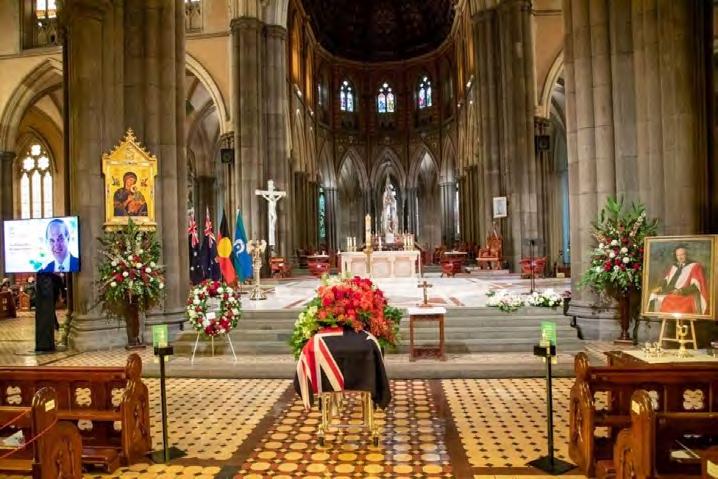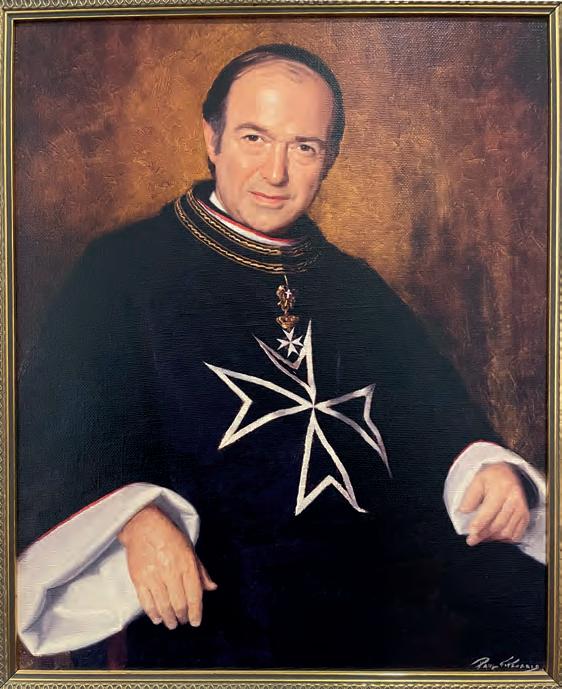
5 minute read
JAMES GOBBO Sir requiem
Requiem for Sir James Gobbo AC CVO QC, +7.11.2021
Is 42:1-3, Ps 23, Romans 8:35.37-39, Jn 14:1-7
We are gathered to commit Jim Gobbo, Sir James, to the compassion and generosity of God, to God’s strength and holiness, to recall Jim and all we knew of him, to ourselves and each other, and so to speak before God, trusting in God’s power and that God will raise us up. In this setting death makes us historians, and it also makes us theologians, for we need to consider God since Jim lived by that reality. As Shirley said to me yesterday: “There was a deep faith in his DNA; he was born into it!”
The family chose the readings we have just heard. They are beautiful, and in their own way they tell Jim’s story. Isaiah speaks of the chosen servant, endowed with God’s spirit to bring true justice to the nations. Writing to the Romans, the apostle Paul is sure that nothing that exists can ever separate us from the love that God, revealed in Jesus, has for us. Properly understood, Christian faith is not primarily about something we do for God. It’s about what God does for and in us. It is not so much an account of human aspiration as it is a revelation of divine desire.
There is a gentle urgency about Jesus’s words in our gospel. “Do not let your hearts be troubled, trust in God still and trust in me.” This is a rallying cry to faithfulness as Jesus draws near to his passion and death through which he will return to his Father. It is a rallying cry to us, his disciples who will also go into death, but with the confidence born out of Jesus’ resurrection from the dead. And he goes on to tell us: “In my Father’s house there are many rooms... I go to prepare a place … so that where I am you may be too.” The Greek word used here for rooms means lasting dwelling places, and Jesus calls this, “my Father’s house”, deepening our awareness that God really is a Father and a loving parent to us.
I came to know Jim Gobbo when I became a chaplain in the Order of Malta, a global lay religious order of chivalry with a nine-hundred-year history, committed to the care of the poor and the sick (treasured as “our Lords the sick”) and the defence of the faith. The enterprise, the vocation, continues, not by displays of power and grandeur, but in the wholehearted giving of self and talents – to Christ present in the poor and the sick, to Christ who is to be worshipped in faith and truth and love. Jim Gobbo was one of its earliest members in Australia, and he was devoted to it. One of its charitable works is to distribute coats to the homeless. As Flavia told to me, he would head out late in the evening to do this, with her thinking that he really looked like he needed a coat himself!
To be homeless is a human tragedy that is defined not only physically in terms of living on the street, under bridges, in empty buildings, in boxes, or in refugee centres.
Homelessness is also about the deep personal sense of “not belonging” – sometimes for a moment, or sometimes constantly and tragically, even in the most affluent situation or in the midst of the happiest crowd. Which is why we need what Jim describes in his autobiography as “the clear beauty of the Gospel narrative”.
The roads we travel in our lives are many. Some are smooth and straightforward, others challenging, some are plain wrong and misleading, others again are also beautiful and very good. There are many things to do in the world, but it is not said that we are meant to do them all. Each of us has a unique calling, which is ours and no one else’s. Jesus reassures us that there is an infinite love awaiting us at the end of our mission in this world. “There are many rooms in my Father’s house; if there were not, I should have told you.” God has a home to which we are all invited. Home is the place where you belong. In the words of the poet Robert Frost, “Home is where, when you go there, they have to let you in.” It also means we must respect every person we meet, no matter how different they are to us, for the Father’s house has many rooms and not just one.
It is impossible to exaggerate the importance of a good home, especially in the life of a young person. To have a home is not just to have a house. It is to have close ties with other people. It is to have a set of relationships in which to stand. Ideally, it is to have people who accept us for what we are; people who give us a feeling of belonging; people among whom we are free to be ourselves, and who by accepting us bring us healing and peace.
It’s to arrive in your ancestral hometown of Cittadella and find the railway platform crowded with extended family to greet you, each to be kissed on both cheeks. For Jim it was to inherit family qualities of hard work, honesty, good manners and religious faith. It meant to live with courage and selfsacrifice, and a special word in Italian, “gentilezza”, a natural dignity and courtesy in dealing with others. Belonging also had other moments, when, like every little child in Italy, you turn up, aged seven, dressed in a blue smock with a large blue bow under the chin, and not speaking a word of English, to start your education at Errol St State School, North Melbourne! A lesser person might then have sworn off all things Italian for life, but this was not Jim’s way, and our multicultural Australia has been graced by his efforts to deepen our love affair with Italy.
Our human consciousness knows only what natural knowledge knows, but there is a sense of greater things which ever haunts us and calls us on. In his poem “The Four Quartets” T. S. Eliot put it this way, “We must be still and still moving / Into another intensity / For a further union, a deeper communion.” There is an infinite love that awaits us at the end of our mission in this world – a home with many rooms, for all the varieties of seekers and believers, with space for each of us in God’s dwelling place, one of mercy, peace and joy, a hidden glory. As he was dying, Pope John XXIII put it this way, “My bags are packed. I feel like a schoolboy going home for his holidays.” As a boarder at Xavier College, Jim would certainly have known that feeling.

So there’s the goal to our lives, and there’s Thomas’s question as well. “But how can we know the way to where you are going?” The answer Jesus gives is strange, “I am the Way.” Usually we speak of someone as leading the way, by word and example, going ahead, a pathfinder, but here the claim is direct.
“I am the Way, the Truth and the Life.” So the path we take, whatever it is, is lived in relationship. For us Christians, true God, true man, Jesus is our Way. What we have is not a road but a person, who loves us and walks with us. It makes all the difference, because when the way is a person then the reality we live by takes on the language of love.
The achievements of Jim Gobbo are many, not least that he was Governor of this state. It’s clear to me that none of this would have been possible without the constant love and support of his wife Shirley through 64 years of marriage, and the home they had together, blessed with the arrival of Jeremy, Flavia, Olivia, Daniela and James.
There is a tiny poem in a novel by Nikos Kazantzakis which reads, “I said to the almond tree, ‘Sister, speak to me of God.’ And the almond tree blossomed.” In Jim Gobbo, in his life of faithful service to others, his gentilezza, we have seen the blossoming. Let us now give praise to the God of whom it speaks.
This requiem was read for The Hon. Sir James Augustine Gobbo AC CVO QC (1931 - 2021). See next page in obituaries for a tribute of his impressive life.










